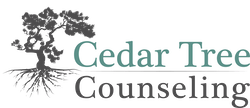Our family of origin plays a significant role in shaping our future. Family of origin refers to the caregivers who raised us, the environment in which we grew up, and the dynamics that influenced our development.
These early childhood experiences form the foundation of our beliefs, behaviors, and patterns in our relationships. Whether our families were nurturing and supportive, or more complicated, the impact of these experiences can echo into our adult lives.
Hi, I’m Alexa Nelson, a Marriage and Family Therapist at Cedar Tree Counseling, and in this article, I’ll share three ways our family of origin impacts our current relationships.
First is Attachment Style
Attachment theory suggests that the way we bonded with our primary caregivers as a child sets the stage for how we form attachments in adult relationships.
For example, if our caregivers were consistently responsive to our needs, we develop a secure attachment style—trusting and feeling safe in relationships. If our caregivers were inconsistent or unpredictable, we might develop an anxious attachment style.
We learn that attention and affection can be fleeting, leading us to become hyper-vigilant about connection in our relationships. As adults, we may frequently seek reassurance and validation from our partners, fearing abandonment or rejection.
If our parents were emotionally distant or dismissive, we might develop an avoidant attachment style. We learn to suppress our emotional needs and rely on ourselves rather than others for comfort. As adults, we may avoid closeness or vulnerability in relationships, struggling to open up to our partners, fearing dependency and rejection.
Understanding your attachment style can provide valuable insight into why you might react a certain way in relationships, and it gives you a starting point for growth.
Second is Modeling Behaviors
Our family of origin shapes our foundational understanding of communication and emotional regulation. The ways we see parents or caregivers handle conflict, express emotions, and respond to stress become ingrained templates for our own behavior.
For instance, if we witness open, respectful communication, we’re more likely to mirror those patterns in our own relationships. If we grow up in a household where conflict was avoided, we might struggle with expressing our own needs or concerns.
If intense arguments are a recurring feature of our environment, we may develop a tendency toward heightened emotional reactivity ourselves. Understanding and recognizing these behaviors is the first step of learning how to respond rather than react, and can significantly improve our quality of life and relationships.
Third is Intergenerational Trauma
Intergenerational trauma can have a profound impact on the emotional well-being of individuals and families. This phenomenon occurs when traumatic experiences, such as war, violence, addiction or abuse, are passed down through the family line, affecting subsequent generations even if they have not personally experienced the trauma.
The effects of intergenerational trauma can manifest in various ways, including difficulty with trust, intimacy issues, emotional regulation problems, physical health problems and mental health disorders.
While our family of origin has a significant influence on us, it’s important to remember that we are not doomed to repeat the past. A therapist can provide a safe and supportive space to explore and transform these dynamics.
If you’re struggling with the impact of your family of origin on your life or relationships, consider scheduling an appointment with us today. We can break free from negative patterns and move towards health and wholeness.

Alexa Nelson
Children, Teens, Young Adults, and Couples
I’m here to provide a safe, compassionate space for healing and growth. Together, we’ll work to understand your unique story, discover healthy coping strategies, strengthen your relationships, and help you find balance.
Choose A Topic!
Cedar Tree's Mission:
There are a lot of broken families who struggle to do life well together.
That’s why we help families create an environment where deeper connection & healing can happen.


